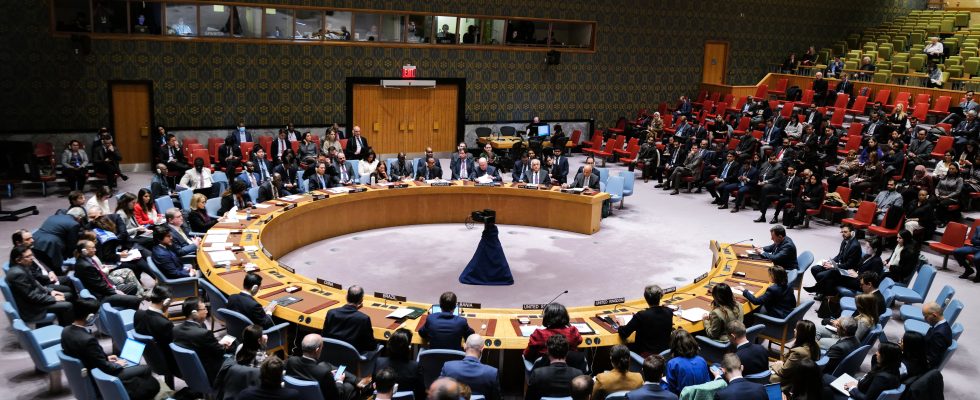Has American resistance been lifted? After days of intense diplomatic wrangling, the UN Security Council adopted a resolution on Friday calling for the “large-scale” delivery of humanitarian aid to Gaza.
If the members of the council took more than a week to vote at the cost of numerous versions less evolved than the first proposal, it was mainly to “guarantee that the United States would not block the text”, observes the New York Times.
The threat of the American veto
The text thus calls for “creating the conditions for a lasting cessation of hostilities” for the security of the humanitarian convoy. But there is no clear mention of a call for a ceasefire. Faced with the insistence of the United States, the resolution does not demand an immediate truce. Instead, it calls for “urgent and prolonged humanitarian pauses and corridors” of unspecified duration and location, “to enable full, rapid, safe and unimpeded humanitarian access.”
In detail, the Council now demands that “the parties to the conflict authorize and facilitate the use of all access and circulation routes available throughout the Gaza Strip”, in particular the full and rapid activation of points of passage such as that of Karam Abou Salem (Kerem Shalom, in Hebrew), for the delivery of humanitarian aid.
“The United States remains Israel’s steadfast ally, despite growing criticism of its military operations and alleged indiscriminate attacks against Palestinian civilians,” the American newspaper said. Foreign Policy. In addition, the outlet also reports that the United States “worked closely with the United Arab Emirates, which was the first to submit the draft resolution, and with Egypt, to reach a compromise.”
The resolution was finally adopted by 13 votes, with two abstentions, including the United States and Russia. “A humanitarian ceasefire is the only way […] to end the nightmare” in Gaza, repeated UN Secretary General Antonio Guterres, directly attacking Israel whose offensive is “the real problem” for the delivery of aid to Gaza.
Russian abstention
While the inhabitants of the Gaza Strip, shelled by Israeli forces in retaliation for the bloody and unprecedented Hamas attack on October 7, are now threatened by famine, “the failure to call for a ceasefire fire […] is incomprehensible and completely cruel”, denounced Sally Abi-Khalil, of the NGO Oxfam. Many other NGOs have criticized the text. Doctors Without Borders (MSF) thus believes that the resolution “has been watered down to the point that its impact on the lives of civilians in Gaza will be almost zero”, while Amnesty International considers it “shameful” that Washington has threatened a veto to “weaken” the content of the text.
“This is a tragic moment for the Council,” blasted Russian Ambassador Vassili Nebenzia, denouncing American “blackmail”. Earlier in the week, an amendment tabled by the Russians proposed a call for an “urgent suspension of hostilities.” But it was blocked by the United States, receiving 10 votes in favor and 4 abstentions.
Council resolutions are intended to have binding legal force. But this does not prevent certain States concerned from not respecting them. “We know that it is not a perfect text, we know that only a ceasefire will put an end to the suffering,” commented Emirates Ambassador Lana Zaki Nusseibeh, at the origin of the text.
But he “responds with action to the desperate humanitarian situation of the Palestinian people.” This is only the second time that he has managed to agree on a text. Its previous resolution of November 15 called for “humanitarian pauses.” Five other texts were rejected in two months, including two due to American vetoes, the last on December 8.
